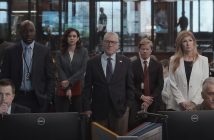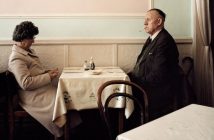When did you last find yourself trapped somewhere on a night out? A tragic victim to fate when a potential encounter turned out to be something else or a wrong turn led to unheralded possibilities? I’ve more than once found myself wandering rain-washed streets long after the last train has rattled down the tracks of circumstance. I’ve no doubt neon signs reflected in pools of oily rain-water were involved too.
And that’s why I love After Hours.
A twisted, tormented trip through the dark streets of down-town Manhattan awaits Paul Hackett (Griffin Dunne) reminding us that hell can often be found on earth. The bare bones of this modern fable bring to mind Dante’s epic poem ‘Inferno’. Every time Paul escapes from one circle of tortured souls, he seems only to fall into another. Compounding his agony are characters who resurface only at the worst times to hound him and push him further into the depths. Franz Kafka is frequently referenced by the screenplay – in the book Paul reads, and in some of the dialogue which is lifted in whole sentences from Kafka’s writing. Writer Joseph Minion draws parallels with the anguish in the face of absurdity which characterizes Kafka’s stories.
After Hours can also be read as an emulation of Carroll’s Alice in Wonderland. A simple object, a ‘plaster-of-paris cream-cheese-bagel paperweight’ in this case, stands in for the White Rabbit, leading the protagonist down The Rabbit Hole into a dreamscape menagerie of weird creatures. Those who seem at first to be friends turn on the merest whim, while even an innocent request can be misconstrued by a paranoid brain. After Hours is New York. A collection of differing – dare I say ‘kooky’? – types thrown together in a confined space, rubbing up against each other with often explosive results.
It takes place over the space of a single night. Paul tries to pick up Marcy (Rosanna Arquette) in a coffee bar. Taking her number, his libido forces him to call right away on the pretence of collecting one of her roommate’s paperweights. He calls her and, after a strained conversation, travels to Soho in a taxi, losing all his money through the cab window. Paul is ensnared, unable to return home without a fare, frustratedly unable to progress his relationship with Marcy (has he misread the signals? Is she deeply scarred physically and emotionally?) and at the mercy of fate.
After Hours features some of my favourite US actors, including a perky turn from Terri Garr, a benevolent John Heard, a giddy Catherine O’Hara, stoner comedians Cheech & Chong and a hysterically disturbed turn from Rosanna Arquette. Other familiar faces turn up as bondage artistes, criminal low lives, punk clubbers and misunderstood gay men. Vertiginous camera moves and nervy acting from Griffin Dunne help propel a fast-paced narrative.
Watch After Hours in conjunction with King of Comedy as an exploration of Scorsese’s black comedy oeuvre. Stylistically this certainly feels like the same New York as Taxi Driver. Or show the film to someone as a historical lesson on what a night out was like before the ubiquity of cash machines and mobile phones. For anyone who remembers those ‘dark ages’ it will strike chord and possibly make one yearn for a time when it was possible to be truly alone in a city.




